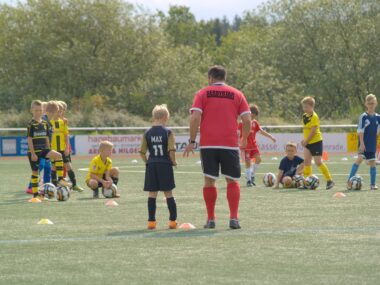Teaching Values: Integrating Ethics into Sports Training Programs
In recent years, the importance of integrating ethical leadership into sports training programs has gained significant traction. Parents, coaches, and athletes are increasingly recognizing that fostering a culture of ethical behavior is essential for building well-rounded athletes. This integration not only enhances individual character but also promotes a sense of responsibility among competitors. Using a values-based approach can instill a deeper understanding of fairness and respect within athletes. Schools and sports organizations are now prioritizing values such as integrity, accountability, and teamwork in their training regimens. These values help guide athletes in making ethical decisions both on and off the field. Moreover, discussions around fair play ensure that athletes recognize the importance of honesty during competitions. Emphasizing ethical dilemmas in training can provide valuable learning experiences, ultimately leading athletes to cultivate principled behaviors. By intentionally incorporating these elements into sports education, young athletes can develop into leaders who exemplify fairness and integrity. Consequently, the focus shifts from merely winning to fostering character, which reinforces the sport’s foundational ethics and enriches the overall sporting experience.
One of the critical aspects of promoting ethical leadership in sports is the role of educators and coaches in modeling these behaviors. Coaches who exemplify integrity and fairness serve as role models for athletes, reinforcing the values instilled during training. These leaders are crucial because they set the tone for team culture and influence young athletes’ perspectives on competition. By actively demonstrating ethical decision-making and sharing personal experiences, coaches can teach athletes about the importance of fair play and respect for opponents. Establishing a safe environment where athletes can openly discuss ethical dilemmas encourages critical thinking. This way, athletes gain the tools necessary to navigate complex situations they may encounter in competitive settings. Furthermore, transformative teaching methods such as scenario-based learning and role-playing can effectively engage athletes in discussions about ethics. Athletes are more likely to embrace these concepts when they can relate them to real-life situations. As coaches actively involve themselves in these discussions, they develop strong relationships with athletes that foster trust and openness. Through intentional guidance and mentorship, coaches nurture a generation of athletes who prioritize ethical leadership in their sports engagement.
The Role of Values in Athletic Development
Incorporating values into sports training has far-reaching implications beyond the immediate sports experience. Research indicates that athletes who embrace ethical principles during their training are more likely to carry these values into their personal lives. Teaching integrity, respect, and responsibility in sports settings empowers athletes to make ethical choices off the field. Encouraging the practice of these values allows athletes to approach daily challenges with a strong ethical compass. Positive role models and mentors reinforce these principles, enabling athletes to visualize the positive impacts of ethical leadership. Moreover, when athletes experience the benefits of fair play and teamwork firsthand, they are more likely to advocate for these principles within their communities. This grassroots approach to fostering ethics can lead to widespread cultural shifts in how society views sportsmanship. Programs that emphasize emotional intelligence alongside athletic training create well-rounded individuals capable of serving as leaders in sports and beyond. By prioritizing values such as sportsmanship, athletes can cultivate trust both within their teams and among competitors. A sport is thus transformed into a platform for personal and communal growth when values take center stage.
Moreover, it’s essential to continuously evaluate and validate the effectiveness of ethical training programs within sports. Gathering feedback from athletes, coaches, and parents can provide valuable insights into the programs’ impact on developing ethical leaders. Implementing regular assessments allows organizations to adapt and refine their approaches over time. By responding to this feedback, sports organizations can ensure they meet the evolving needs of their athletes and foster an environment conducive to ethical behavior. It is also important to recognize that ethical training should not only occur at the beginning of a season but should be an ongoing process. Continuous reinforcement of core values keeps these principles at the forefront of athletes’ minds, ensuring they remain active in their competitive sports lives. Additionally, involving community stakeholders in discussions about ethics can enhance the programs’ relevance, building connections between sports, communities, and shared values. By emphasizing collaboration among various stakeholders, teaching opportunities can broaden the scope and depth of ethical training. Ultimately, these efforts contribute to creating a culture where ethical leadership in sports becomes a standard expectation rather than an exception.
Challenges to Ethical Leadership
Nonetheless, integrating ethics into sports training faces numerous challenges. One significant barrier is the competitive pressure athletes encounter in their pursuit of excellence. While striving for victory, many may overlook the importance of fair play, leading to ethical compromises. A culture that prioritizes winning at all costs can detrimentally impact athletes’ choices and behaviors. Furthermore, societal influences, including media portrayals of sports, can skew young athletes’ perceptions of what constitutes success. Addressing these challenges requires systemic changes within sports organizations, embracing ethical guidelines that prioritize fair competition over mere victories. In addition, fostering a culture of accountability among coaches and athletes can pave the way for addressing issues of unethical behavior. Organizations must address situations where wrong actions are ignored or overlooked, highlighting instead the consequences brought about by unethical practices. Encouraging transparent discussions surrounding these challenges is crucial in creating a safe space for athletes to voice their concerns. By systematically addressing these obstacles, sports programs can cultivate a genuine commitment to ethical leadership that empowers athletes to thrive in their competitive environments.
For the successful implementation of ethical leadership training in sports, collaboration with educational institutions is crucial. Schools and universities play an essential role in shaping the values of young athletes. Partnerships with educational bodies can ensure a seamless integration of ethical training within sports curricula. These partnerships can also facilitate workshops, seminars, and educational sessions specifically targeting ethics in sports. Opportunities for mentorship and guidance from experienced educators help reinforce the significance of ethical principles in sports. Additionally, establishing community outreach programs can expand the reach of these ethical training initiatives, benefitting not only athletes but also their families and communities. Collaboration promotes a holistic approach to developing moral character and ethical decision-making in young athletes. Organizations can create a ripple effect influencing broader community standards by engaging with various stakeholders. Furthermore, fostering relationships between local sports clubs and educational institutions encourages the sharing of best practices regarding the development of ethical leaders. When everyone involved shares a commitment to instilling core values, a stronger foundation for ethical leadership in sports emerges.
Conclusion: The Future of Ethics in Sports
Ultimately, promoting ethical leadership in sports remains essential for the holistic development of athletes. As we consider the future of sports training, prioritizing ethics is a responsibility shared by parents, coaches, and organizations. By embedding ethical values into training programs, we ensure the next generation of athletes embraces accountability, fairness, and respect. Such values serve as a foundation not only for athletic success but also for personal growth and societal impact. A culture that values ethics can improve the sports landscape, elevating the essence of competition to healthier standards. It is vital for stakeholders to remain committed to creating an atmosphere where ethics guide behaviors and decisions. Efforts must be understandably directed towards making ethics an intrinsic aspect of training and competition. Continuous advocacy and education surrounding these principles will help reinforce their relevance as sports evolve. As communities witness first-hand the positive impacts of ethical leadership in sports, a renewed emphasis on values can lead to lasting change across all levels of competition. Investing in ethical leadership today paves the way for a future where sports embody the highest values of integrity and fairness.





